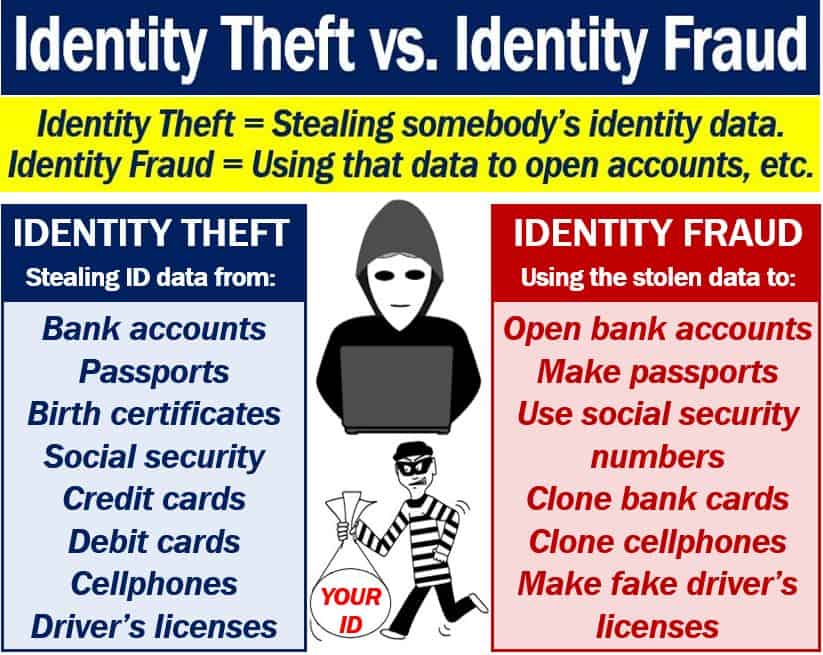Identity theft or identity fraud involves stealing another person’s identity and then buying goods and services by deception. Through identity fraud, the fraudster assumes another person’s identity. The fraudster works pretending to be another person. If they can get away with it, they can even get married using the identity they stole.
Identity fraud, if carried out successfully and secretly, means the perpetrator can open bank accounts and take out loans. They can claim and receive state benefits. They can do all those things using somebody else’s identity.
If the other person is still alive, they may suddenly find that their credit rating has plummeted. For example, when they apply for a loan to purchase a car, the lender may turn them down.
For somebody with an excellent credit rating, this can come as a big shock.
If you find that your credit score has plummeted for no logical reason, you might be a victim of identity fraud. A person’s credit score tells lenders whether they are a bad or good credit risk. The higher the score, the better their credit rating, i.e., the more lenders can lend them.
To protect yourself, you may want to consider an identity theft protection service which monitors your data and/or credit card information across the web.

Identity theft vs. identity fraud
Stealing another person’s identity is identity theft. Identity fraud, on the other hand, occurs when the thief does things with the identity they stole.
For example, if I steal your social security number, passport number, bank account details, birth certificate, I am committing identity theft.
If I then use what I stole to assume a false identity and then buy things using that identity, I am committing identity fraud. If I get a job and give my employer the other person’s social security number, I am committing identity fraud.
Put simply; identity theft means stealing, while identity fraud means doing illegal things with that stolen identity.
Action Fraud, a website that belongs to the British Police, defines the two terms as follows:
“Identity theft happens when fraudsters access enough information about someone’s identity (such as their name, date of birth, current or previous addresses) to commit identity fraud.”
“Identity fraud can be described as the use of that stolen identity in criminal activity to obtain goods or services by deception.”
Why does identity theft happen?
Thieves and fraudsters commit crimes to make money. Fraudsters may steal another person’s identity to:
- Obtain loans and credit cards.
- Obtain state benefits.
- Open a bank account.
- Take over another person’s existing accounts.
- Open mobile phone contracts.
- Obtain passports, driving licenses, and other documents under another person’s name.
In the UK and many other countries, stealing a person’s identity does not, on its own, constitute fraud. However, using that identity for any or some of the activities above does.
Where can identity theft occur?
The US Department of Justice says that people can become victims of identity theft and identity fraud for a number of reasons. Below are details on the three most common ways in which we can become victims of identity theft or fraud.
Public Places
‘Shoulder surfing‘ is a common trick. The criminal watches you from a location nearby as you key in your credit card or telephone calling card number.
Alternatively, the perpetrator may listen in to your telephone conversation while you give your credit card details.
If you get applications for ‘pre-approved’ credits cards in the post, make sure you tear them up before discarding them. Criminals may pick them up, if you don’t destroy them, and try to activate the cards.
If other people have access to your mail, make sure you can trust them.
Spam
Spam means unsolicited email. Never respond to spam, especially if it promises some benefit and requests personal data.
There are thousands of cases of identity theft each week globally due to spam.
Ignore all spam messages!
The US Department of Justice adds:
“With enough identifying information about an individual, a criminal can take over that individual’s identity to conduct a wide range of crimes.”
